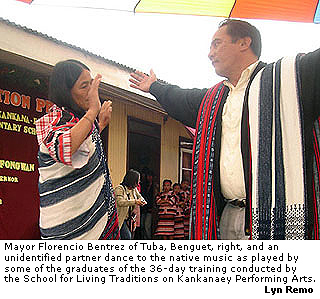TUBA, Benguet - Eighteen elementary pupils have completed an intensive training conducted by the School for Living Traditions on Kankanaey Performing Arts. A joint undertaking of the Kabuyao Elementary School (KES) and the National Commission for Culture and the Arts (NCCA), the students spent 36 days to learn about the culture and traditions of their ancestors. The graduates were among more than 50 interested elementary pupils. "They may be young but are capable of recognizing the value of their culture this early so as to preserve and take pride in their identity as indigenous peoples," said Sammy Pulido, cultural training coordinator. Barangay Kagawad Felix Siplat, one of five community elders who helped teach the children, explained that the community is now a mixture of the original Ibaloi residents; Kankanaey settlers from central and north Benguet; Kalanguyas from the boundary of Ifugao and Benguet; and Ilocanos. "Inter-marriages have resulted in mestizos among our children," Siplat said adding that his children resulted from a Kankanaey-Ibaloi union. Although the training was for Kankanaey performing arts, this could not be divorced from the Ibaloi practices. Siplat saw to it that he interpreted native terms in both Kankanaey and Ibaloi languages. He also annotated the presentations seeing to it that he incorporated the dominant cultures of the co-existing Cordillera tribes. The training administered by both teachers and elders of sitio Kabuyao in Poblacion, Tuba ran from May 28 to September 10. Among the elders who acted as cultural trainers are Bairo Patalek, Wangkay Billit, Joseph Tayabes, Kgd. Felix Siplat and Delia Pakipak.
Beyond music and dance, a way of life In a closing and recognition program for the first part of the four-phase training, which may run for four consecutive years, one of the trainees said the children learned about discipline, cooperation, humility, patience and assertion besides having been introduced to the traditional music and dances. "
Nasuruanak ti saan a panagbabain babaen iti rehearsals," (I learned not to be shy through the rehearsals) proclaimed 10-year old Maryrose Domingo, also a trainee. "
Naadalak a no adda ti aramiden ti grupo, madi ti agpa-importante," (I learned that when the group does one activity, it is not good for anyone to waste other people's time waiting) added 9-year old Luzviminda Litawen. She also said she was reminded that before young people would make a decision, they have to consult their elders. In the program, Litawen portrayed the role of a young lady who consulted her aunts when she had to choose from three young men who all wanted her for a wife. KES teacher-in-charge Edgar Vicente looked forward to replicating the training for all children in Kabuyao. He observed that during the trainings and rehearsals, many pupils showed interest and they had been indirect beneficiaries of the training program. "It is a community endeavor," he said as he acknowledged the role of parents and elders in transferring to the youth the values and good aspects of the indigenous culture.
Team-building Vicente realized through the training that culture is something that children learn simultaneously. As the boys play the
tallak, solibao, takik, pinsak and
gangsa the girls learn to dance to the rhythm. "Any wrong note or timing makes the whole thing a disaster," Vicente said. Cony Dangpa-Subagan, one of the project implementers, said values are incorporated in the workshops, where children learn to work with a group and move as one. In their highest performance level, the children acted as naturally as possible as they portrayed adult roles as that of a native priest
mansip-ok in the Ibaloi and Kankanaey languages, community elders or the
mananakem, men and women who are carriers of wisdom and are therefore consulted.
Support Benguet Governor Nestor Fongwan, Tuba Mayor Florencio Bentrez, local education and elected officials were among those who have extended support and appreciation to the efforts at preserving the indigenous culture by teaching boys and girls. Fongwan recalled an anecdote when as a young pupil he had to miss classes due to an ailment which doctors could not heal. "If I only knew then, I should have consulted a
mansip-ok so I did not have to miss school," he told the audience. NCCA provided P50,000 for the first phase and is set to extend some P500,000 more for the next three phases, according to Vicente.
GMANews.TV 
